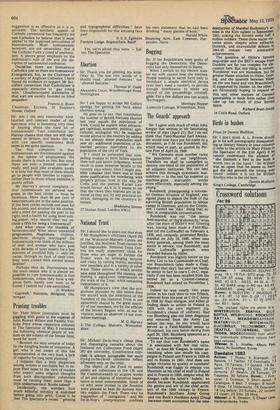The Guards' approach
Sir: 1 agree with much of what John Keegan has written in his fascinating review of Alex (April 21). But I do not think that Field-Marshal Earl Alexander would ever have put his name to a document, as F-M von Rundstedt, did, which read in part, as quoted by Picture Post of April 24, 1948: "We Germans must number twice the population of our neighbours. Therefore we shall be compelled to destroy one-third of the population of all adjacent territories. We can best achieve this through systematic malnutrition — in the end far superior to machine-guns ... starvation works more effectively, especially among the young.
Rundstedt, presupposing a successful German invasion of England, also signed plans to deport the bulk of the surviving British population to labour camps in Germany and on the Contin.ent. I cannot see 'Alex' doing that, ei: ther, in comparable circumstances.
Rundstedt was not "the senior field-marshal of thqWehrmacht," even. after the start of Hitler's war. Goering was, having been made a Field-Marshal (of the Luftwaffe) on February 4, 1938, and, uniquely, promoted Reichsmarshal on July 19, 1940, when nine Army generals, among them the most senior in service, von Rundstedt. and three Luftwaffe generals, were awarded batons by Hitler. Rundstedt was slightly senior on the Army List to his Commander-in-Chief, von Brauchitsch (also made a FieldMarshal that day), but one can hardly be senior in fact to one's C-in-C, especially if one has been recalled from the retired list as a Colonel-General. Rundstedt had retired on November 1, 1938.
Indeed he was nearly two years junior in his rank then to von Fritsch, removed from his post as C-in-C Army in 1938 by Nazi intrigue, and killed or finding death in action in Poland in 1939 with his own regiment (cp. Rundstedt's choice of uniform). Had von Blomberg also not been disgraced and removed from the Army List before the war, he too would have served as a Field-Marshal senior to Rundstedt, his own baton dating from April 20, 1936. Blomberg appeared as a witness at Nuremberg. To say that von Rundstedt's name "is associated with few real victories," as does Mr Keegan, is rather astonishing when one recalls his cam paigns in Poland and France in 1939-40 and in Russia in 1941. And does one judge victories by quality or numbers?
Rundstedt was happy to employ von Manstein as his chief of staff in Poland and in France in 1939, despite what Mr Keegan calls the latter's 'hubris,' no doubt because Rundstedt appreciated
the genius and wit of the chief architect of the 1940 victory in France. Rundstedt's Southern Army Group and von Bock's Northern ArmY.Grouti. between them accounted for the near Spectator May 12,1973 destruction of Marshal Budyenny's armies in the Kiev salient in September, 1941, costing the Soviets some half. a million soldiers. These three major victories alone, despite other setback.s, Dunkirk, and unavoidable defeats om 1944-45 remain very substantial achievements.
The question of Hitler's famous stop-order and the BEF's escape from Dunkirk are far too complex for discussion here. But one thing is certain. Rundstedt was not blameless, but far greater blame attaches to Hitler. Goering, and the quarrels between Hitler on the one hand and von Brauchitsch, ill supported by Haider, on the other. I am fortunately hoping to expand on, this and other matters of German 'generalship in book form rather than, take up too much of your limited space.
Brett smith


































 Previous page
Previous page